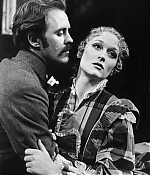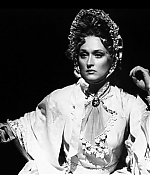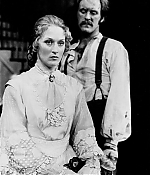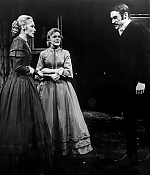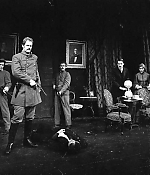|
Simply Streep is your premiere source on Meryl Streep's work on film, television and in the theatre - a career that has won her the praise to be one of the world's greatest working actresses. Created in 1999, we have built an extensive collection to discover Miss Streep's body of work through articles, photos and videos. Enjoy your stay.
|
Celebrating
25 years
of SimplyStreep
|
Secret Service
April 12, 1976 - May 02, 1976
· The Phoenix Theatre
|
Directed by: Daniel Freudenberger
· Literature: William Gillette
· Costume Design: Clifford Capone
· Production Design: James Tilton
· Music: David Rapkin

This 1895 thriller by William Gillette tells the tale of a Union spy, Captain Thorne (John Lithgow), working to seize control of the telegraph office in Richmond, Virginia in 1864. Posing as a wounded Confederate captain named Thorne, the spy's false orders to a Confederate Army Commander raise the suspicions of a southern agent, who uses a local girl, Edith Varney (Meryl Streep), as his reluctant accomplice to set a trap. PBS taped and televised "Secret Service" for its "Great Performances" programme in January 1977, marking Meryl Streep's debut on television.
Cast & Characters
Reviews
The Village Voice, April 19, 1976
The most successful exponent of the play’s high style is Meryl Streep, whose Edith Varney is a specimen of Southern young womanhood very different from the memorable sexy, sloppy, dim-witted Baby Doll she played just a few weeks ago in the Phoenix’s revival of “27 Wagons Full of Cotton”. This time Ms. Streep flirts with a fine Southern archness, as if she had just come back with the wind, then rises to splendi imperious defiance and sinks to utter emotional exhaustion. Always extravagant but never excessive, she uses her body for a magnificent fullness of communication. Her extravagance makes us laugh at her sometimes, but it is laughter of admiration; it never weakens the suspense for a moment, nor breaks us out of sympathy for Edith Varney.
The most successful exponent of the play’s high style is Meryl Streep, whose Edith Varney is a specimen of Southern young womanhood very different from the memorable sexy, sloppy, dim-witted Baby Doll she played just a few weeks ago in the Phoenix’s revival of “27 Wagons Full of Cotton”. This time Ms. Streep flirts with a fine Southern archness, as if she had just come back with the wind, then rises to splendi imperious defiance and sinks to utter emotional exhaustion. Always extravagant but never excessive, she uses her body for a magnificent fullness of communication. Her extravagance makes us laugh at her sometimes, but it is laughter of admiration; it never weakens the suspense for a moment, nor breaks us out of sympathy for Edith Varney.
New York Magazine, April 26, 1976
In any case, the Gillette play has gotten from the Phoenix the best treatment of the season’s four shows. Daniel Freudenberger’s direction strikes a consistent tone zany enough to point up the absurdities in this tale of a Civil War spy redeemed by love without demolishing the play. His cast strikes some delicious poses, and a couple of splendid performances, by John Lithgow ans the spy and Meryl Streep as his ladylove, give the work some semblance of focus. However, Charles Kimbrough as the villain is so involved with hissing out his spiteful lines that the words themselves are often inaudible. The evening is greatly enhanced by some Confederate songs performed by members of the cast, sung in delectable close harmonies, during scene changes.
In any case, the Gillette play has gotten from the Phoenix the best treatment of the season’s four shows. Daniel Freudenberger’s direction strikes a consistent tone zany enough to point up the absurdities in this tale of a Civil War spy redeemed by love without demolishing the play. His cast strikes some delicious poses, and a couple of splendid performances, by John Lithgow ans the spy and Meryl Streep as his ladylove, give the work some semblance of focus. However, Charles Kimbrough as the villain is so involved with hissing out his spiteful lines that the words themselves are often inaudible. The evening is greatly enhanced by some Confederate songs performed by members of the cast, sung in delectable close harmonies, during scene changes.
The Milwaukee Journal, January 11, 1977
With fine leading performances from John Lithgow and the brilliant and beautiful Meryl Streep, the production is satisfactory.
With fine leading performances from John Lithgow and the brilliant and beautiful Meryl Streep, the production is satisfactory.
Awards & Nominations
☆ Drama Desk Award as Outstanding Actress in a Play

